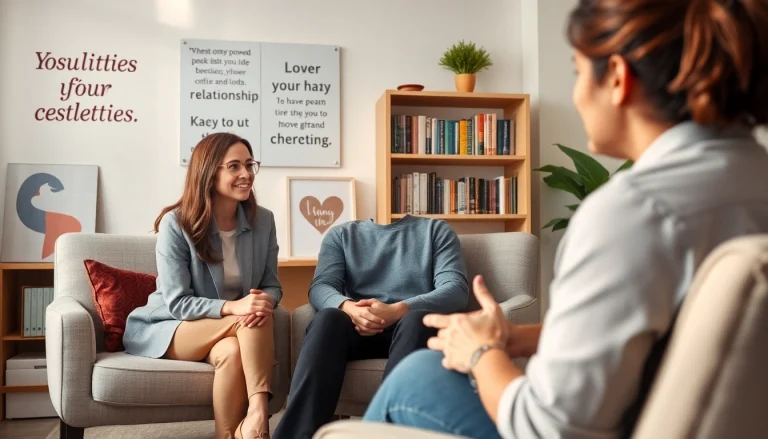
Understanding the Role of a Relationship Coach
The world of relationships can often be complex and challenging, filled with emotional highs and lows. It’s here that a relationship coach steps in, acting as a guide to help individuals and couples navigate through their relational difficulties. Relationship coaches have become increasingly popular as they offer structured support and practical strategies aimed at fostering healthier dynamics and deeper connections between partners. But what exactly does a relationship coach do, and how can they benefit those seeking assistance in their personal lives?
What Does a Relationship Coach Do?
At its core, a relationship coach focuses on helping people improve their interpersonal relationships. This encompasses a wide range of issues, from romantic partnerships and family relations to friendships and workplace dynamics. Relationship coaches utilize various tools and techniques to assist clients in identifying their relationship patterns, improving communication skills, and resolving conflicts.
Coaching differs from counseling in that it is generally more future-focused. While therapists often delve into past experiences that impact behavior, coaches tend to concentrate on achieving specific goals moving forward. This forward-thinking approach is rooted in actionable strategies that aim to enhance the client’s relationship skills in a constructive manner.
Benefits of Working with a Relationship Coach
Engaging with a relationship coach offers numerous benefits that can significantly enhance the quality of one’s relational life. Here are some key advantages:
- Enhanced Communication Skills: One of the primary areas coaches focus on is improving communication. Clients learn how to express their needs and feelings more clearly, which helps reduce misunderstandings and tension.
- Conflict Resolution: Learning how to manage disagreements constructively is crucial. Coaches provide strategies that empower clients to tackle conflicts head-on without escalating into arguments.
- Improved Self-Awareness: Coaches help clients reflect on their own behaviors and patterns, fostering greater self-understanding and empathy toward others.
- Goal Setting: Clients work with coaches to set achievable relationship goals, whether it’s rekindling romance or improving family dynamics.
- Support and Accountability: A coach offers support throughout the process, holding clients accountable for the actions they’ve committed to undertake.
When to Seek a Relationship Coach’s Help
There may be several indicators that someone could benefit from working with a relationship coach. Common scenarios include:
- Difficulty in communication with a partner or family member.
- Recurring conflicts that leave both parties feeling drained without resolution.
- Challenges in establishing or maintaining boundaries in relationships.
- Desire to enhance intimacy and connection in a romantic relationship.
- Life transitions such as marriage, divorce, or blending families that create uncertainty.
Recognizing these situations early can pave the way for healthier interactions, making it a proactive choice to engage a coach rather than waiting for issues to escalate.
Common Challenges Addressed by a Relationship Coach
Many people face challenges in their relationships, leading to frustration and disconnect. A relationship coach can equip clients with the necessary tools to tackle these common issues effectively.
Communication Issues in Relationships
Effective communication is the backbone of any healthy relationship. However, many individuals struggle to communicate their feelings, desires, and concerns appropriately. A relationship coach teaches methods to facilitate open dialogue, including:
- Active Listening: Coaches educate clients on the importance of truly hearing and understanding their partner’s perspective.
- Non-Verbal Communication: Understanding body language and tone can significantly alter the way messages are perceived.
- Communication Styles: Recognizing each person’s unique communication style fosters empathy, allowing partners to adjust their approach for better understanding.
Conflict Resolution Strategies
Every relationship encounters conflicts at some point. It’s how couples handle those disputes that can either strengthen or weaken their bond. Coaches introduce several strategies for effective conflict resolution, such as:
- Time-Outs: Establishing a cooling-off period when disputes become heated helps prevent escalation.
- Finding Common Ground: Coaches work with clients to identify shared goals during disagreements, which facilitates collaboration versus competition.
- Using “I” Statements: Clients learn to express thoughts and feelings from their perspective without blaming or criticizing, promoting healthier discussions.
Building Trust and Intimacy
Trust and intimacy form the foundation of deep, meaningful connections. Coaches help clients navigate the complexities of building and maintaining these elements with techniques such as:
- Vulnerability Exercises: Encouraging partners to share fears and insecurities fosters an environment of safety and openness.
- Positive Reinforcement: Coaches guide clients in appreciating and acknowledging each other’s efforts, bolstering trust over time.
- Creating Shared Experiences: Activities designed to deepen emotional bonds are highlighted, helping partners reconnect in positive ways.
Choosing the Right Relationship Coach
Finding the right relationship coach is crucial to the success of the coaching experience. With many options available, it can feel overwhelming to choose the right one. Here’s a guide to help navigate this process:
Qualifications and Experience to Look For
When selecting a relationship coach, consider the following:
- Certifications: Look for coaches who have training and certification from recognized institutions in relationship coaching or a related field.
- Experience: A coach with substantial experience has likely encountered various relationship dynamics, providing them with a breadth of knowledge and solutions.
- Specialization: Some coaches may specialize in certain areas such as couples, singles, or specific cultural considerations. Ensure their expertise aligns with your needs.
Assessing Compatibility with Your Coach
Beyond credentials, a strong coaching relationship hinges on personal compatibility. Assess compatibility by:
- Initial Consultation: Many coaches offer a free initial session. Use this opportunity to gauge comfort levels and communication styles.
- Values Alignment: Ensure that the coach’s values and methods resonate with your own beliefs about relationships.
- Trust Your Instincts: Pay attention to how you feel during conversations with potential coaches; a gut feeling can be a significant indicator of fit.
Understanding Coaching Methodologies
Each coach may employ distinct methodologies. Understanding these approaches can be helpful when selecting a coach. Some common techniques include:
- Solution-Focused Coaching: This approach emphasizes identifying solutions rather than dissecting problems.
- Transformational Coaching: It aims to create profound changes within individuals that lead to shifts in relationships.
- Behavioral Coaching: This method focuses on altering behavior patterns through awareness and strategic practice.
Techniques and Tools Used by Relationship Coaches
Relationship coaches utilize various techniques and tools to facilitate growth and improvement in relationships. Here are some common methods employed during coaching sessions:
Communication Exercises
Practicing effective communication is vital. Coaches often assign exercises that help clients improve their articulation and expression, such as:
- The Conversation Wheel: This tool promotes varying degrees of sharing and listening, helping clients experience different elements of communication.
- Role-Playing: By simulating difficult conversations, clients gain greater insight into both their feelings and those of their partner.
Goal Setting with Your Relationship Coach
Goal setting is a crucial component of coaching. Effective collaboration leads to clearer targets. Coaches may guide clients to:
- Create SMART Goals: Specific, Measurable, Achievable, Relevant, and Time-bound goals help provide clarity and focus.
- Regular Review: Setting up periodic checkpoints allows clients to reflect on progress and make adjustments as necessary.
Monitoring Progress and Accountability
Accountability mechanisms foster commitment to personal and relational growth. A relationship coach often:
- Maintains Journals: Asking clients to document feelings, interactions, and reflections supports continued self-assessment.
- Regular Check-Ins: Scheduled sessions help ensure that priorities remain focused, and encourages breakthroughs in challenging periods.
Measuring the Success of Working with a Relationship Coach
Ultimately, seeking assistance from a relationship coach aims to yield tangible improvements in relational dynamics. Measuring success can appear subjective, yet several key indicators emerge during the process:
Feedback and Adaptation
The coaching journey includes regular feedback loops between the coach and client. This dialogue allows for necessary adaptations in coaching methods and ensures progress remains aligned with the client’s needs.
Indicators of Improvement in Relationships
Success indicators may vary depending on individual circumstances, including:
- Increased Communication: Partners report feeling more connected and understood after implementing coaching strategies.
- Reduced Conflicts: A noticeable decrease in conflicts and more constructive resolutions to disagreements signal growth.
- Heightened Intimacy: Couples may notice a rekindling of romance and a deepening emotional bond over time.
Long-term Strategies for Relationship Maintenance
The end of formal coaching doesn’t mean the end of progress. Clients are often equipped with tools to maintain healthy dynamics over the long run, including:
- Regular Check-Ins: Maintaining ongoing check-ins encourages sustained engagement and commitment to the relationship.
- Continued Learning: Clients are encouraged to read, attend workshops, or engage in community events that foster relationship growth.






